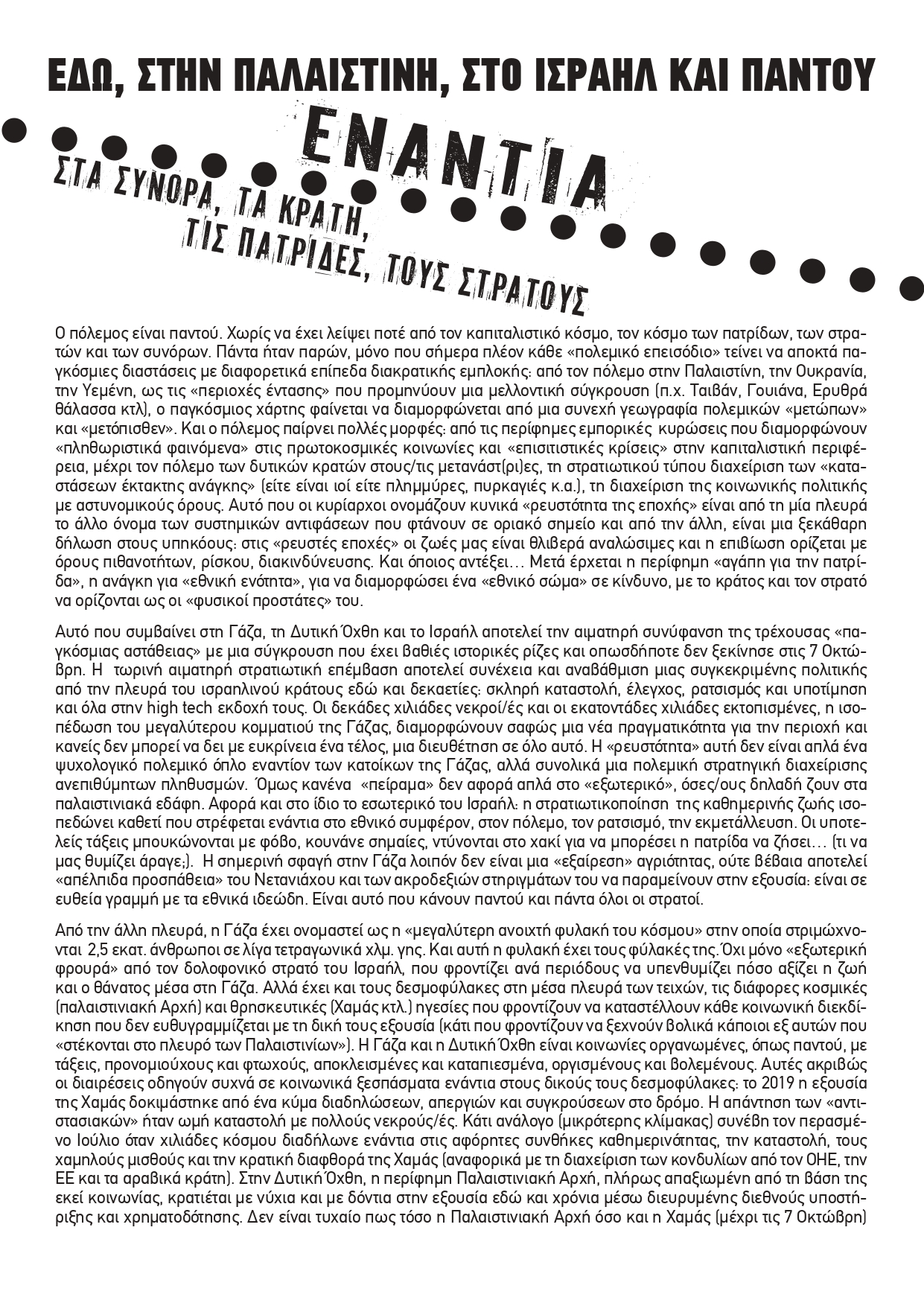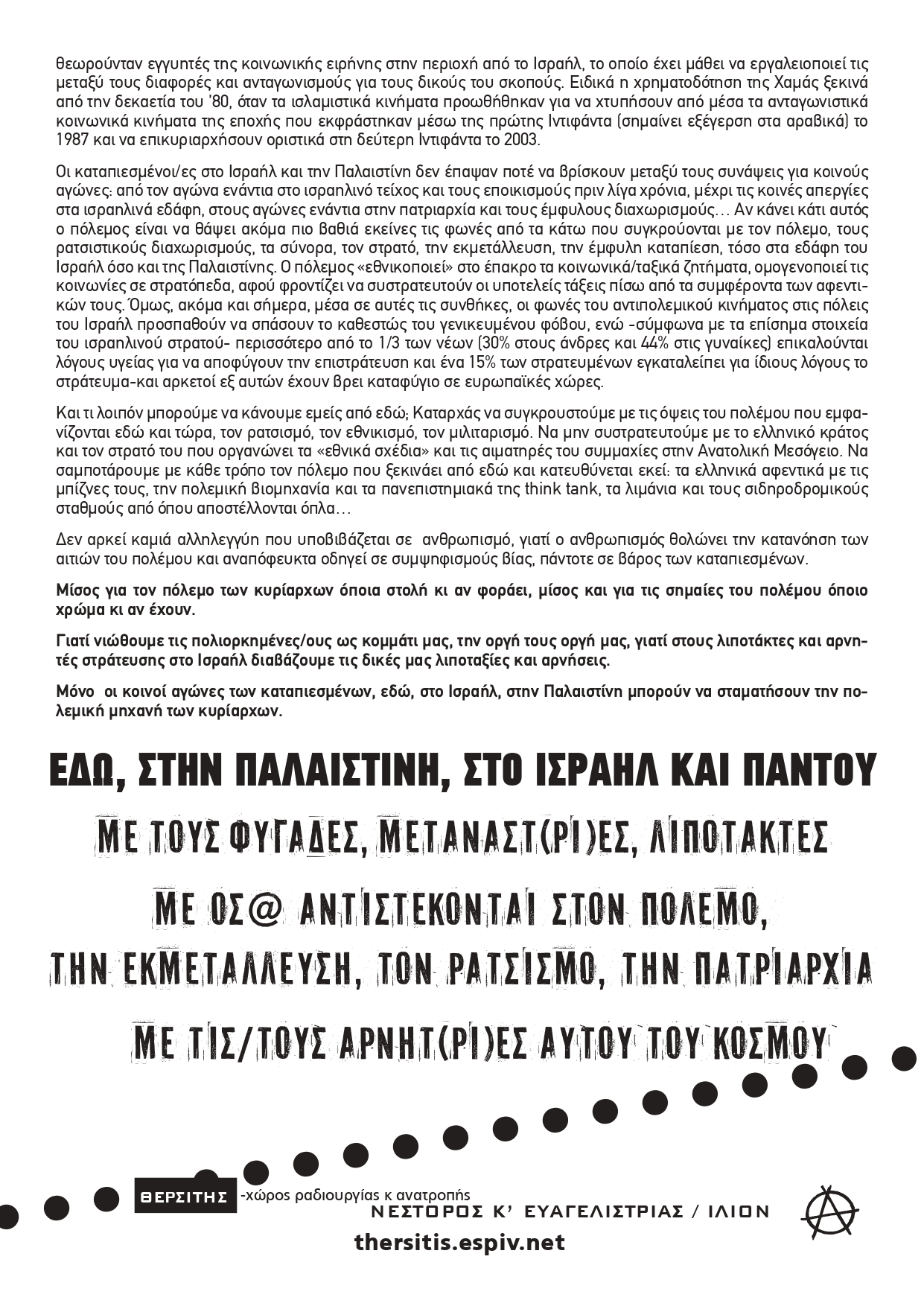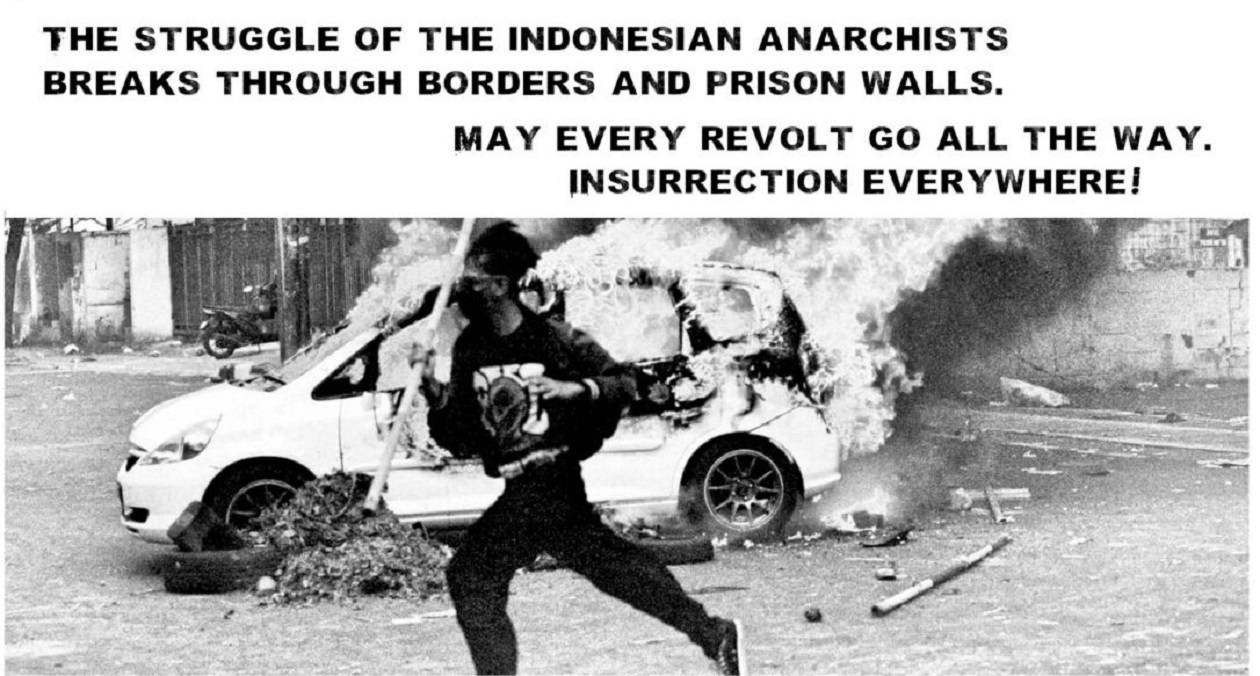

Here, in Palestine, in Israel, everywhere
Against borders, states, homelands, armies
War is everywhere. Without ever having been absent from the capitalist world, the world of homelands, armies and borders. It has always been present, except that nowadays every “war episode” tends to acquire global dimensions with different levels of transnational involvement: from the war in Palestine, Ukraine, Yemen, to the “tension zones” that presage a future conflict (e.g. Taiwan, Guyana, Red Sea, etc.), the world map seems to be shaped by a continuous geography of war “fronts” and “rears”.
And war takes many forms: from the famous trade sanctions that create “inflationary phenomena” in primitive societies and “food crises” in the capitalist periphery, to the Western States’ war on immigrants, the military-style management of “states of emergency” (be it viruses or floods, fires, etc.), the management of social policy in police terms. What the rulers cynically call “era fluidity” is on the one hand the other name for systemic contradictions reaching a limit point and on the other, it is a clear statement to subjects: in “fluid times” our lives are sadly expendable and survival is defined in terms of probability, risk, risk. And whoever lives through it… Then comes the famous “love of country”, the need for “national unity”, to form a “national body” in danger, with the State and the army defined as its “natural protectors”.
What is happening in Gaza, the West Bank and Israel is the bloody entanglement of the current “global instability” with a conflict that has deep historical roots and certainly did not start on October 7th. The current bloody military intervention is a continuation and upgrade of a specific policy applied by the Israeli state for decades: harsh repression, control, racism and belittling, all in their high tech version. The tens of thousands dead and hundreds of thousands displaced, the flattening of the greater part of Gaza, clearly shape a new reality for the region and no one can clearly see an end, a settlement to all this. This “fluidity” is not just a psychological warfare weapon against the people of Gaza, but altogether a war strategy for managing unwanted populations. However, no “experiment” concerns simply the “outsider”, that is, those who live in the Palestinian territories. It also concerns the interior of Israel itself: the militarization of everyday life flattens everything that goes against the national interest, war, racism, exploitation.
The subordinate classes cower in fear, wave flags, dress in khaki so that the motherland can live… (what does it remind us of?). Today’s massacre in Gaza is therefore not an “exception” of brutality, nor is it a “desperate attempt” by Netanyahu and his far-right supporters to remain in power: it is in line with national ideals. It is what all armies do everywhere and always.
On the other hand, Gaza has been called the “world’s largest open prison” with 2.5 million people crammed into a few square kilometres of land. And this prison has its guards. Not just an “outside guard” from Israel’s murderous army, which makes sure periodically to remind how much life and death inside Gaza are worth. But it also has the guards on the inside of the walls, the various secular (Palestinian Authority) and religious (Hamas, etc.) leaderships who make sure they suppress any social claim that does not align with their own authority (something that some of those who “stand with the Palestinians” conveniently forget). Gaza and the West Bank are societies organized, as everywhere, by class: the privileged and the poor, the excluded and the oppressed, the angry and the comfortable. These very divisions often lead to social outbursts against their own caretakers: in 2019, Hamas’s rule was tested by a wave of protests, strikes and street clashes. The response of the “resistance” was brutal repression with many dead. Something similar (on a smaller scale) happened last July when thousands of people demonstrated against the unbearable daily conditions, repression, low wages and State corruption of Hamas (regarding the handling of funds by the UN, EU and Arab states). .
In the West Bank, the famous Palestinian Authority, thoroughly discredited by the base of society there, has been clinging to power for years through extended international support and funding. It is no coincidence that both Palestinian Authority and Hamas (until October 7) were considered guarantors of social peace in the region by Israel, which has learned to instrumentalize the differences and rivalries between them for its own purposes. In particular, the financing of Hamas dates back to the 1980s, when Islamist movements were promoted to defeat the opposing social movements of the time that were expressed through the first Intifada (meaning uprising in Arabic) in 1987 and to dominate definitively in the second Intifada. in 2003.
The oppressed in Israel and Palestine have never stopped finding connections for joint struggles: from the struggle against the Israeli wall and settlements a few years ago, to the joint strikes in the Israeli lands, to the struggles against patriarchy and gender divisions… If this war is doing anything it is burying even deeper those voices from below that clash with war: racial divisions, borders, the military, exploitation, gender oppression, both in the lands of Israel and and Palestine. War “nationalizes” social/class issues to the maximum degree, homogenizes societies into camps, since it ensures that subordinate classes rally behind the interests of their masters. However, even today, within these conditions, the voices of the anti-war movement in the cities of Israel are trying to break the regime of generalized fear, while – according to the official figures of the Israeli army – more than 1/3 of the young ( 30% of men and 44% of women) cite health reasons to avoid conscription and a 15% of conscripts leave the army for the same reasons – and several of them have found refuge in European countries.
So what can we do from here? First of all let’s confront the aspects of war that come to light here and now: racism, nationalism, militarism. Let us not ally ourselves with the Greek State and its army that organizes “national plans” and its bloody alliances in the Eastern Mediterranean. Let’s sabotage in every way the war that starts here and goes there: the Greek bosses with their businesses, the war industry and its university think-tanks, the ports and railway stations from where weapons are sent…
No solidarity reduced to humanitarianism is enough, because humanitarianism clouds the understanding of the causes of war and inevitably leads to repayments in violence, always at the expense of the oppressed.
Hatred for the war of the rulers whatever uniform it wears, hate for the flags of war whatever colour they have.
Because we feel the besieged as part of us, their anger our anger, because in the deserters and refusers of conscription in Israel we recognize our own desertions and refusals.
Only the common struggles of the oppressed, here, in Israel, in Palestine, can stop the war machine of the rulers.
Here, in Palestine, in Israel, everywhere
With the fugitives, immigrants, deserters
With those who resist war, exploitation, racism, patriarchy
With the deniers of this world
via:thersitis
Translated by Act for freedom now!
